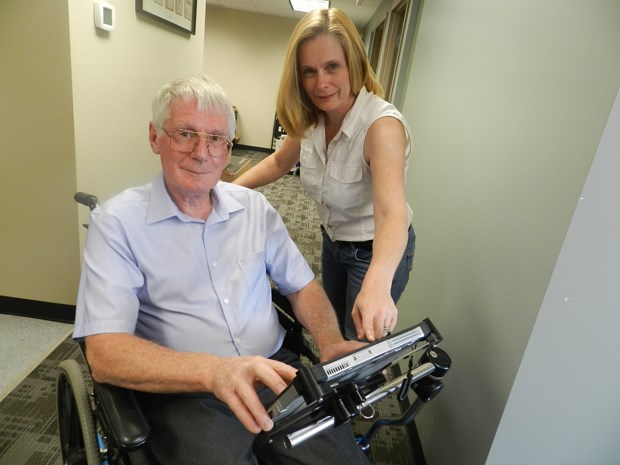Try and stump Geoffrey Webb with a problem and he’ll likely give you a huge “thank-you” when he provides the solution.
That’s because Webb, founder of Richmond’s Daedalus Technologies back in 1986, has been developing “fixes” in the form of specialized brackets and mounts for wheelchairs to support all manner of equipment to assist the disabled. And when there’s a solution, it’s added to the firm’s ever-increasing catalogue of parts.
“Years ago I used to say that we could solve 80 per cent of the problems 80 per cent of the time. I think we’re probably above that 80 per cent now,” said Webb with a smile.
The growing repertoire of parts to provide near-custom solutions means the likelihood of more satisfied customers who rely on the aluminum and stainless steel products to hold expensive, and sometimes delicate, communications devices, such as a speech synthesizer used by celebrated theoretical physicist Stephen Hawking who also happens to be a customer.
It’s support equipment such as that which Daedalus will have on display as one of the exhibitors at Saturday’s (Aug. 15) Technology Fair Through a Disability Lens event presented by Richmond Centre for Disability at the Executive Airport Plaza Hotel and Conference Centre.
Just like the narrow market Daedalus serves, the background and qualifications required to bring the solutions to life were also specialized. But Webb fit the bill.
“I am both a machinist toolmaker, so I know how to make things,” he said, “and I’m also a PhD biological chemist, so I can talk to scientists and researchers. And if they wanted something made, I’d make it.”
Mainly tasked with constructing complex machinery for researchers and educational institutions, Daedalus switched directions after Webb’s reputation prompted an inquiry requesting a way to attach an electronic voice synthesizer to a wheelchair.
“Sunnyhill Hospital (now known as Sunny Hill Health Centre for Children) had an order for eight of the (voice) devices from the manufacturer in the U.S., and it was contingent on them being attached to a wheelchair,” Webb said. “So, I started designing the system and worked with the therapists at Sunnyhill for months.”
With a successful solution found, the company pushed the scientific equipment aside and focused on components for the wheelchair mounting systems.
But there were challenges. As much as finding a solution to a bracket-mounting problem was critical, so was the cost in manufacturing the “fix.”
“The trick in most metal manufacturing is being able to make the part, which performs a function, quickly enough so that the cost is not completely intolerable,” Webb said, adding that part of the solution he found was having a wide variety of standardized components that can be put together in a combination to provide as near a custom fit as possible.
And that can be critical since some new, communications technologies require exact placing in front of users in order to work to their optimum levels.
“A lot of the modern equipment works on what is called Eye Gaze which tracks a person’s eyes,” Webb said. “So, the computer screen has to be mounted very stably, precisely in front of where the person can see because, perhaps, they can’t move the rest of their body, only their eyes.
“We can achieve that because we have so many bits and pieces.”
Currently, the company’s catalogue has more than 600 components, said Dawn Drewery, the firm’s business manager.
“That’s enough to solve pretty much any situation,” she said.
And when a solution is achieved, it can often be pretty profound.
Webb recalled one from early in the company’s history when sales focused mostly on the educational system in the U.S.
There, users of wheelchair-mounted voice synthesizers were only allowed to use the costly devices in the classroom setting and not allowed to take them home unless they had a proper, wheelchair-mounting system.
After selling the correct mounts to individual customers for a while, Webb said he received a letter from a family who had bought a Daedalus bracket system.
“It was from a family with a child who was just 12-years-old and was allowed to take their communication device home,” Webb said. “And for the first time in his life this child was able to say ‘Hello daddy,’ when his father came home from work.”



